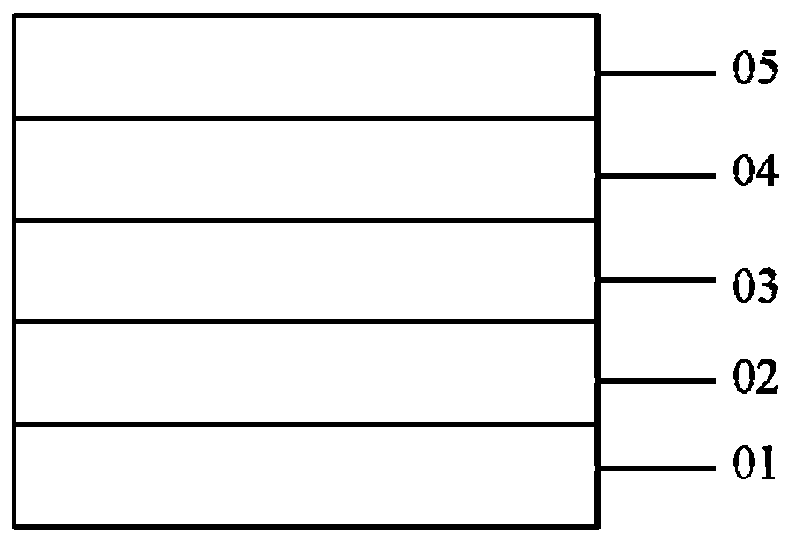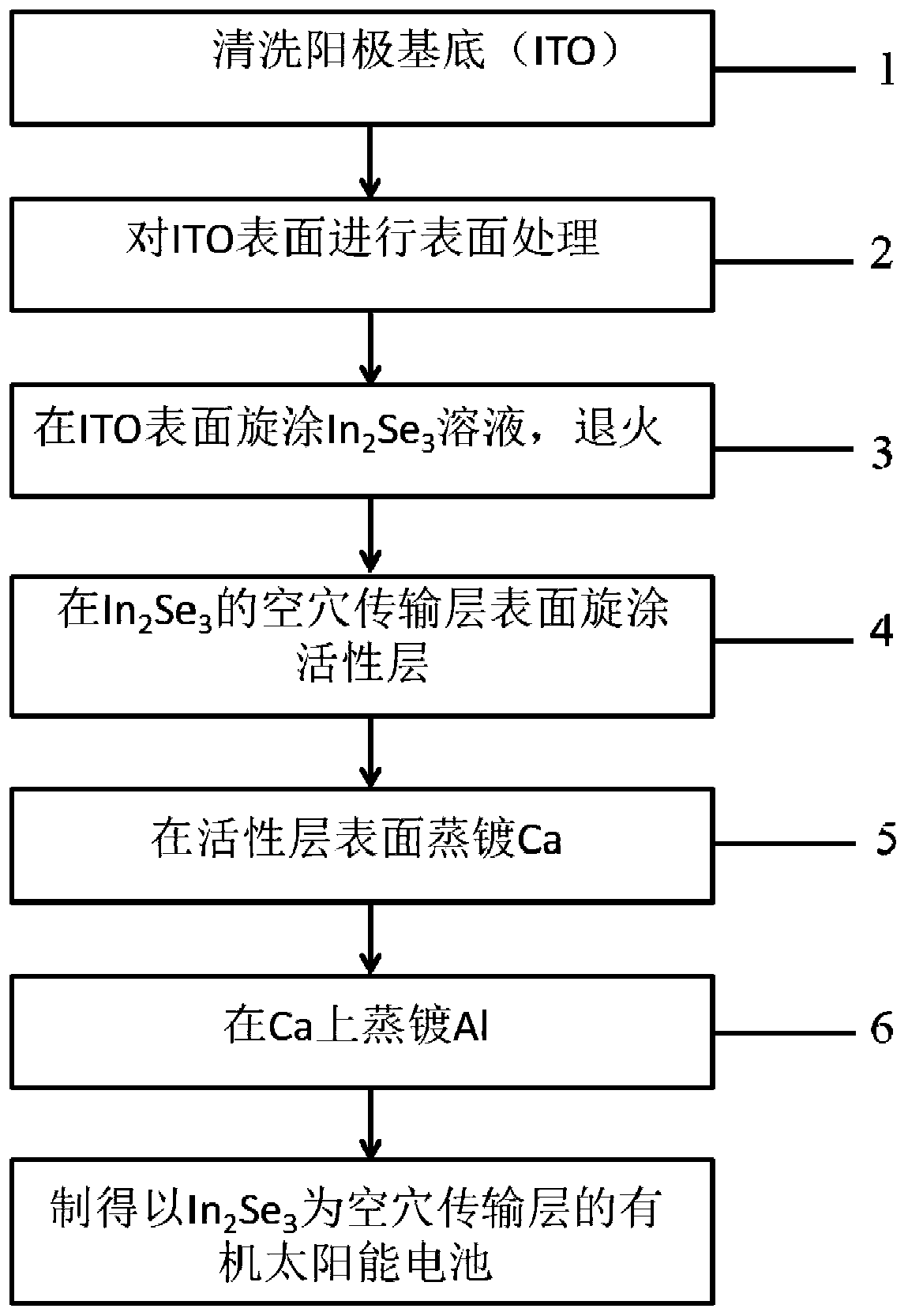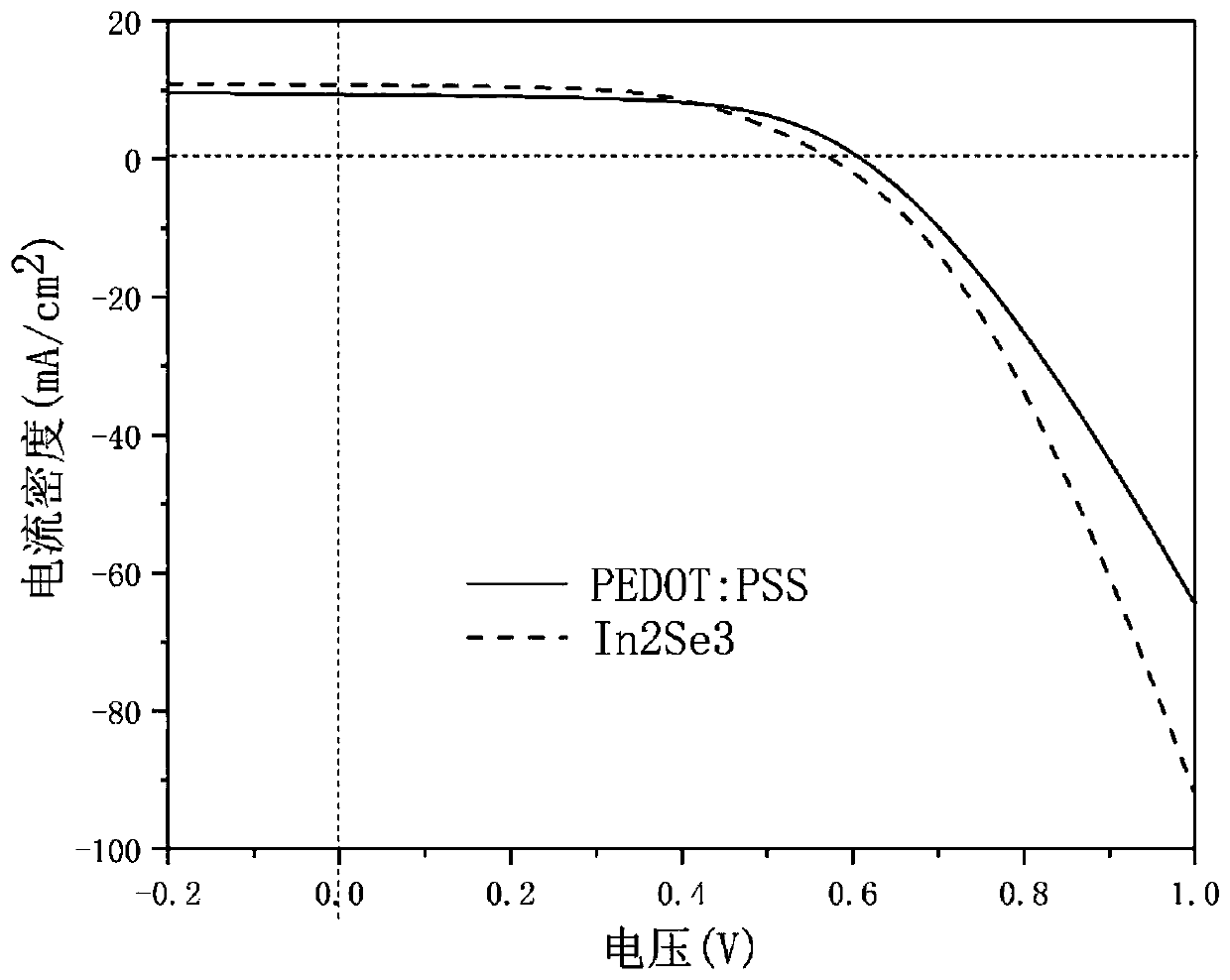Organic solar cell with In2Se3 as hole transport layer and preparation method of organic solar cell
A hole transport layer and solar cell technology, applied in the field of solar cells, can solve the problems of device stability, limited charge transmission and collection, and limited photoelectric conversion efficiency of cells, so as to reduce sensitivity and improve charge transfer efficiency. Effect
- Summary
- Abstract
- Description
- Claims
- Application Information
AI Technical Summary
Problems solved by technology
Method used
Image
Examples
Embodiment 1
[0037] In this embodiment, In 2 Se 3 The structure of the organic solar cell device as the hole transport layer: ITO / In 2 Se 3 / P3HT:PCBM / Ca / Al.
[0038] In the above 2 Se 3 The preparation process of the organic solar cell as the hole transport layer is as follows:
[0039] Step 1. Use detergent, deionized water, acetone, absolute ethanol, and isopropanol to ultrasonically clean each for 20 minutes; then dry in a vacuum drying oven at 80°C;
[0040] Step 2. Plasma surface treatment is performed on the surface of the cleaned and dried anode substrate (ITO) for 13 minutes. This treatment method uses the strong oxidizing properties of ozone generated under microwave to clean the residual organic matter on the ITO surface, and at the same time, it can make the ITO surface oxygen. Increase the vacancy and increase the work function of the ITO surface;
[0041] Step 3. Spin-coating In on the ITO surface treated in Step 2 2 Se 3 Solution; the In 2 Se 3 The solution preparation process is: I...
Embodiment 2
[0050] In this embodiment 2 with In 2 Se 3 The structure of the organic solar cell device as the hole transport layer: ITO / In 2 Se 3 / P3HT:PCBM / Ca / Al.
[0051] In the above 2 Se 3 The preparation process of the organic solar cell as the hole transport layer is as follows:
[0052] Step 1. Use detergent, deionized water, acetone, absolute ethanol, and isopropanol to ultrasonically clean each for 15 minutes; this time, dry in a vacuum drying oven at 80°C;
[0053] Step 2. Plasma surface treatment is performed on the surface of the cleaned and dried anode substrate (ITO) for 15 minutes. This treatment method uses the strong oxidizing properties of ozone generated under microwave to clean the residual organic matter on the ITO surface, and at the same time, it can make the ITO surface oxygen. Increase the vacancy and increase the work function of the ITO surface;
[0054] Step 3. Spin-coating In on the ITO surface treated in Step 2 2 Se 3 Solution; the In 2 Se 3 The solution preparation p...
Embodiment 3
[0060] In this embodiment 3, In 2 Se 3 The structure of the organic solar cell device as the hole transport layer: ITO / In 2 Se 3 / P3HT:PCBM / Ca / Al.
[0061] In the above 2 Se 3 The preparation process of the organic solar cell as the hole transport layer is as follows:
[0062] Step 1. Use detergent, deionized water, acetone, absolute ethanol, and isopropanol to ultrasonically clean each for 17.5 minutes; this time, dry in a vacuum drying oven at 85°C;
[0063] Step 2. Plasma surface treatment is performed on the surface of the cleaned and dried anode substrate (ITO) for 14 minutes. This treatment method uses the strong oxidizing property of ozone generated under microwave to clean the residual organic matter on the ITO surface, and at the same time, it can make the ITO surface oxygen. Increase the vacancy and increase the work function of the ITO surface;
[0064] Step 3. Spin-coating In on the ITO surface treated in Step 2 2 Se 3 Solution; the In 2 Se 3 The solution preparation proce...
PUM
 Login to View More
Login to View More Abstract
Description
Claims
Application Information
 Login to View More
Login to View More - R&D
- Intellectual Property
- Life Sciences
- Materials
- Tech Scout
- Unparalleled Data Quality
- Higher Quality Content
- 60% Fewer Hallucinations
Browse by: Latest US Patents, China's latest patents, Technical Efficacy Thesaurus, Application Domain, Technology Topic, Popular Technical Reports.
© 2025 PatSnap. All rights reserved.Legal|Privacy policy|Modern Slavery Act Transparency Statement|Sitemap|About US| Contact US: help@patsnap.com



